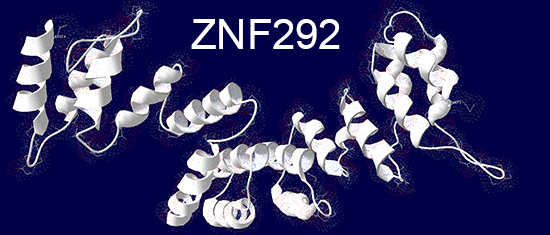 |
HOME CONSERVATION C-TERMINAL ANALYSES DNA AND RNA SEQUENCES RESEARCH QUESTIONS RESULTS RESOURCES REFERENCES |
|
There have been several reports of ZNF292 being mutated in cancers. The National Cancer GDC Data Portal lists uterine corpus endometrial carcinoma has having the highest incidence of ZNF292 mutations (20.57%). Mutations are also common in gastric cancers: colon (11%), rectum (8.76%) and stomach (8.41%) adenocarcinomas. Much of the literature has focused on its role in gliomas, gastric/colon cancer, chronic lymphocytic leukemia and prostate cancer. Prostate Cancer An interesting result was obtained by Kluth (2017). Studying hundreds of prostate cancer cancers they found deletions in chromosome 6 around the 6q14.3 locus to be very common. Increased deletion sizes correlated with poor prognosis. They studied many of the genes in that area of chromosome 6 including ZNF292 and found at least four of them to be involved in repressing growth of the cancer cells. They used shRNAs singly or in combination to knock down mRNA expression levels of suspected repressor genes to near 50% of normal to model heterozygous mutations. Cell growth increased with ZNF292 knock-down. The shRNA used was from a region of exon 8, the exon that codes for the bulk of the protein including all 16 zinc fingers. So far this is the only use of an shRNA knock down directed to ZNF292 that would definitely affect the canonical mRNA. Others have been directed to the circular RNA. shRNA TGAAGGCTGTGACCGTATATA |